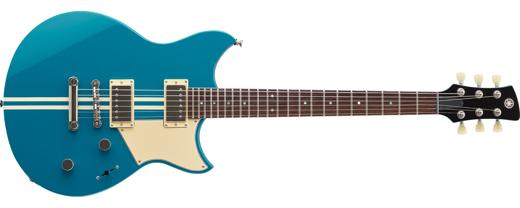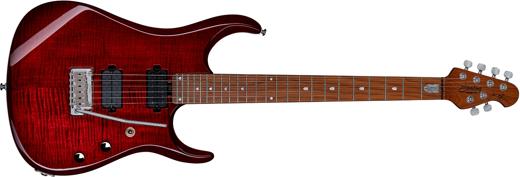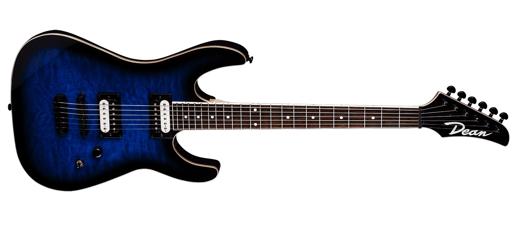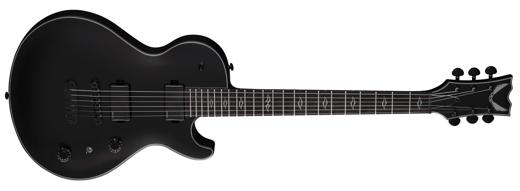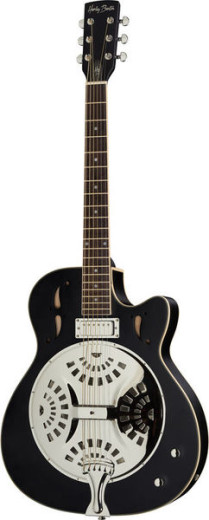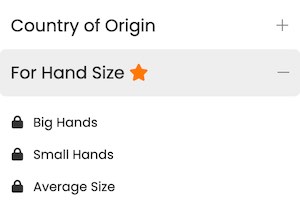Harley Benton CLN-150CE Black Review & Prices
- From Harley Benton's 2019 Bluegrass series
- Made in China
- 6 strings
- 25"'' scale
- 15.748" Fretboard Radius
- Sapele body
- Okoume neck
- Purple Heart fretboard
- Bridge pickup: Rising P3004 Mini Humbucker (Humbucker/Passive)
- 1 volume and 1 tone Speed knobs
- Purple Heart / Maple bridge
- U Shape Set neck
- 20 Medium Jumbo frets
- Machine headsDLX, die-cast tuners
- Compare Specs >
Our Scores and Tone Evaluation
- Heavy Metal
- Hard Rock
- Jazz
- Blues
- Funk
- Country
Harley Benton CLN-150CE Black
- Bone Nut
- Cheap Fret Wire (NS)
- No Locking Tuners
- Made in China
- No Expensive Woods
- No Top Brand Pickups
- No Neck-Through Build
- No Push Knob or Extra Switch Option
- No Luminescent Inlay
- No Tremolo
- No Compound Radius Fretboard
- No 21:1 Tuner Ratio
- No Strap Lock
Price Overview
Its average competitor's price is $400, which means that the Harley Benton CLN-150CE Black is around 60% cheaper than the competition. This takes into account all instruments of the same category in our database with 6 strings and Fixed bridge that are made in China.
These are affiliate links. We may earn a fee if you purchase after clicking. These prices are prone to error. Make sure you're buying the right product after clicking on a link from our site. We are not liable if you buy the wrong product after following these links. As an Amazon Associate site we earn from qualifying purchases.
Videos







Your feedback
Not all instruments are created equally. That's why it's important to have different opinions. Here's what our users who have played this instrument say. If you've played it before, help others by voting below!
Weight
VoteTuning stability
VoteNeck speed (thickness)
VoteNeck access to high frets
VoteNeck profile shape
VoteFret edges
VotePickups noise
VotePickups power
VoteExplore All From Harley Benton >
Is it Easy to Play?
The Harley Benton CLN-150CE Black meets 4 out of our 8 criteria items for beginner friendliness, which means that it's not bad for beginners, but it could be better. This takes into account the type of frets, scale length, nut width, bridge type, fretboard radius, and neck profile to determine the easiest combination for new players to get used to.
New Player Friendliness
Harley Benton CLN-150CE Black- Comfortable shape
- Easy-to-use bridge
- Tall frets
- Comfortable neck
- Comfortable fretboard
- Narrow nut
- Short scale
- Locking tuners
Hand Size Comfortability
After taking into account the neck profile, scale size, fretboard radius, and nut width, we can conclude that the Harley Benton CLN-150CE Black's construction is balanced for most hand sizes.
Nevertheless, this comes down in the end to personal preference. Make sure you test this guitar—or another one with similar characteristics—before buying.
Scale Length
Scale length is the distance the strings will span between the bridge and the nut. It can tell you a lot about the overall playability and tone of the instrument. A longer scale length means longer distance between frets, brighter tone and more string tension—which means lower action, but more difficult bending of the strings.
Here's the Harley Benton CLN-150CE Black's 25" scale length compared to other common sizes:
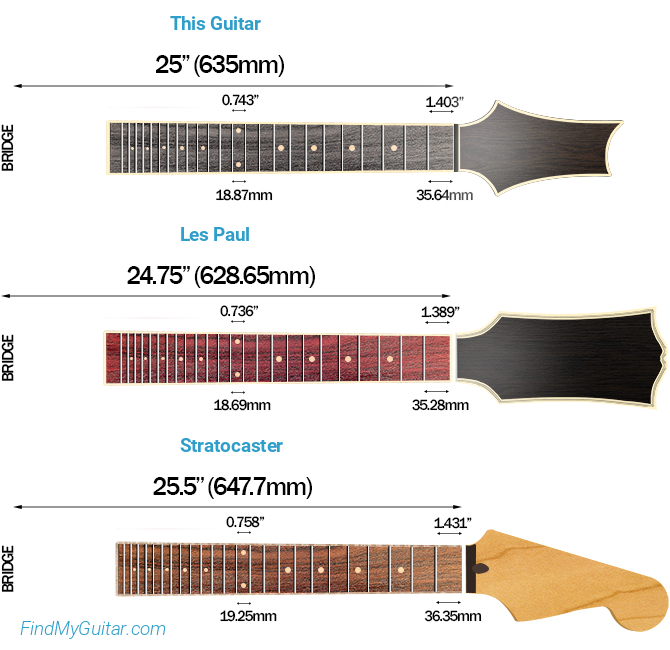
This is the scale found in most PRS guitars, and it's right between the length of most Stratocasters and Les Pauls.
The scale length will affect the separation of the frets, the string tension, and even the tone of the guitar. The longer the scale, the more separated the frets are, which makes it a bit harder to move fast on the fretboard. Also, the higher tension of the strings will make them feel stiffer, so bending will require more strength. However, a longer scale also allows you to lower the action of the strings and make them closer to the fretboard, which makes them easier to press. Finally, the tone will also sound brighter with a longer scale.
A 25'' scale makes all of this feel right between a Stratocaster (longer scale) and a Les Paul (shorter scale).
Don't forget that you can also affect the tension of the strings by changing your string gauge.
Neck Profile
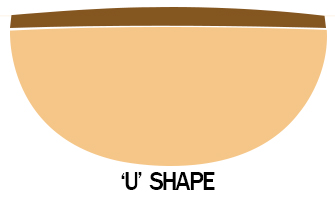
The neck profile tells you the thickness (neck depth) and shape in cross section. Every difference will completely change the feeling and comfortability of the neck. This is a highly subjective thing, but most players indeed prefer certain types of necks (like Cs and Ds) because they feel nice in most hands.
It has a U type neck. This shape usually has more 'shoulders' than a C neck. It's great for guitarists who love the feel of a vintage neck. Most of them are thick, which makes it better for people with big hands. However, some of them can be thin like a C neck but with more mass to the sides for a better grip.
Fretboard Radius
When it comes to fingerboard radius, personal preference will dictate which one is better for you. However, most people seem to agree that a more curved (lower) radius will make it easier to play chords while a less curved (higher) radius is better for soloing and bending.
The Harley Benton CLN-150CE Black has a 15.748" fingerboard radius.
Here's an image comparing this fretboard radius to other popular choices:

Compound radius fingerboards give the best of both worlds. Unfortunately, the Harley Benton CLN-150CE Black has the same radius across the board.
Playability compared to main competitors
Nut Width
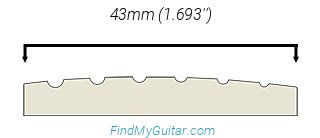
The Harley Benton CLN-150CE Black has a nut width of 43mm (1.693''). This is within the most common range of nut widths for a 6-string guitar. It offers a good balance of string separation at the nut. It's the size that most guitarists prefer as it gives them just enough space to play open chords without muting the strings, but without spreading the strings too wide and making bar chords difficult to perform.
Frets
The Harley Benton CLN-150CE Black has 20 frets. Even though 24 frets has become really popular, there's still a good reason to get fewer frets; the pickup at the neck position will be further away from the bridge. This makes the neck pickup achieve a warmer tone. You might want this if you're playing Jazz or similar genres.
However, if you don't care about the warmer neck pickup, more frets will always be better. It's always nice to have the option to play higher notes if you want to.
It comes with nickel silver frets, so they won't last as long as stainless steel frets. If you use your instrument a lot, you might need to replace the frets after a few years. But this is unlikely as most people change instruments before this happens.
Fret Size

Finally, let's talk about fret size. Some people prefer tall frets because it's easier to press the strings and perform bends since there's less friction against the fretboard. On the other hand, some people like shorter frets because they like to touch the fretboard when playing, or because they got heavy hands and tend to press too much on the string and alter the of the note pitch accidently.
The Harley Benton CLN-150CE Black's frets are Medium Jumbo size. These sit somewhere between a Jumbo and a Medium fret. They're not quite as tall as a full Jumbo, so you'll still feel the fretboard, but you won't feel it as much as with medium frets. This is a good size if you want to make it easy to press the strings but would also like a little bit of ''feedback'' to know when to stop pressing so the notes don't go out of pitch.
Playability Score
Tone Analysis
Wood will have little influence in the final tone of an electric guitar or bass. Instead, the hardware, especially the pickups, will be the most important thing to look at. Bur first, let's see the quality of the wood.
Wood



Sapele Body: It's similar to Mahogany in both color and tone. It can produce warm tones, and it's known for its beautiful figured grain patterns.
Okoume Neck: It's an affordable wood and it was one of the first to replace Mahogany when prohibitions started. It's generally softer than Mahogany and the tone has warmer lows.
Purpleheart Fretboard: Also known as Amaranth, it's a hard, dense wood with a brilliant tone. As its name suggests, the purple color makes this wood look exotic.
Pickups
Unfortunately, it doesn't come with pickups from one of the top brands. This doesn't mean you will get bad pickups, but you might want to consider a pickup upgrade after some time.
These are passive pickups, so you can expect a rounder sound and a moderade level of output.
The Harley Benton CLN-150CE Black's configuration is H. A single humbucking pickup will give you all the space you need for picking, and it might give you a bit more sustain since less magnetic fields are messing with the strings' vibrations. However, you won't have the same versatility as with other guitars with more pickups. It's recommended if you want to use it mainly for high-output riffs.
Versatility
Naturally, the Harley Benton CLN-150CE Black doesn't come with a pickup selector because it's a single-pickup guitar. These instruments have less versatility, but they're good for practicing. Besides being cheaper, limiting yourself to a single-pickup guitar can help you improve by learning to control the tone with your technique and playing style. Things like playing further away from the bridge for a warmer tone, or plucking the strings fast for a snappy sound can help you become a better player.
Unfortunately, it doesn't come with more options for coil split or coil tapping. This makes it less versatile than some competitors.
What music genre is it good for?
As a 6 strings, Hollowbody guitar with H configuration and Passive pickups, we'd recommend it for genres like Country or similar. However, you can use almost any guitar for any genre. This is just the typical type of music for this particular one.
Sound Score
Build Quality Analysis
Country of Origin
Knowing where the instrument is produced is a good way to know how well it's built. Some manufacturing countries are known for having higher quality standards. For example, most expensive instruments are made in the US or Japan, but there are some exceptionally great countries—like South Korea—that are building a good reputation.
The Harley Benton CLN-150CE Black is made in China. So you can expect lower build quality when compared to others made in Korea, Japan or the United States. Guitars made in this country are meant for mass production, which translates into less attention to detail and quality control. This doesn't mean the product is made poorly at all. Chinese products have a bad reputation since long ago, but they've definitely improved a lot the last few years.
Still, remember that we're taking about Harley Benton here, which is a brand with good renown. They know how to use cheap labor in this country without sacrificing too much quality. So you shouldn't end up receiving a useless or ugly instrument.
Bridge
Purple Heart / Maple: The advantage of fixed bridges is that they don't require any kind of set-up. This makes it extremely easy when changing strings because you don't need to adjust anything besides tuning the guitar. Also, the fact that the bridge is directly attached to the body will help to increase sustain. The disadvantage is the lack of versatility since you can't create the same vibrato effects as with tremolo bridges.
Nut Material
Another important thing to analyze is the nut material, as it's one of the most important aspects that can affect the sound and playability of your guitar. A well-cut nut will make sure it stays in tune and will make it more comfortable to play.
In this case, the Harley Benton CLN-150CE Black has a Bone nut. This material is one of the highest quality you can get. It provides excellent sustain and tune stability if cut well. The only disadvantage is that it's an organic material, so it's not consistent. Two different bone nuts, even if made from the same bone, will probably sound slightly different. However, bear in mind that this is only relevant when playing open strings.
Neck Joint
The neck joint is the part where the neck of the guitar meets the body. There are three main techniques to attach both parts together: Set-In, Bolt-On and Neck-Through. The latter two provide different advantages, although neck-throughs are the most expensive.
This guitar has a Set neck joint. This type of neck joint consists of using different pieces of wood for the neck and the body of the guitar. Both pieces are then glued together. This is more expensive to make than a bolt-on neck, but it's cheaper than a neck-through guitar. Some people believe that this gives more sustain than a bolt-on neck due to both pieces having a 'better connection' than with bolts. Still, it's something difficult to prove.
However, this type of neck joint does have the disadvantage of not allowing you to easily swap the neck for another. This makes this type of neck joint less mod-friendly.
Build Quality Score
All Specs
Harley Benton CLN-150CE BlackUser Reviews
Help others by sharing your opinion about this guitar. Note: to avoid spam, your review will be submitted for approval before appearing here.
